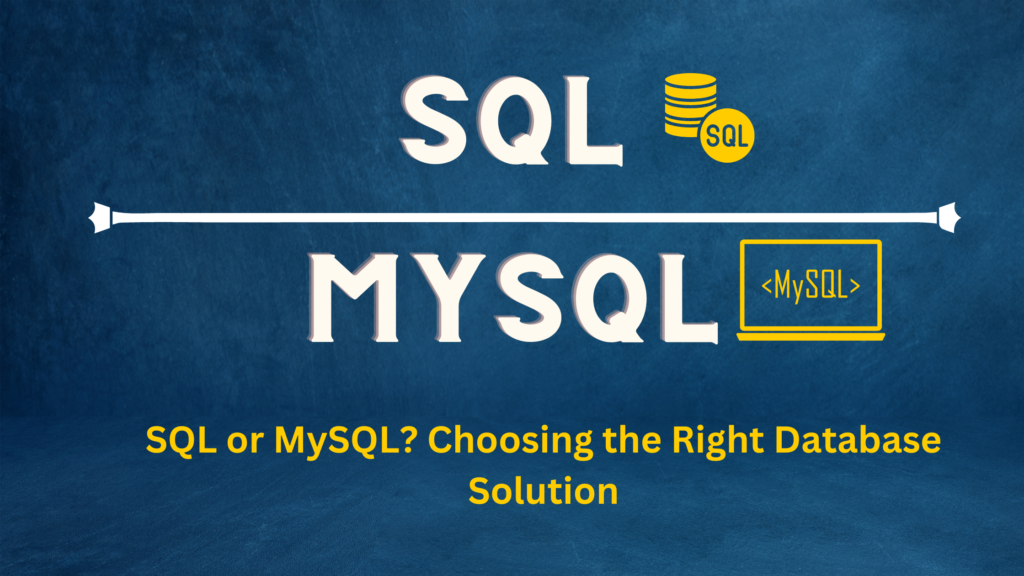Differentiating SQL and MySQL: A Comprehensive Guide

Below is a tabular representation highlighting the key differences between SQL and MySQL:
| Feature | SQL | MySQL |
| Definition | Standardized language for managing relational databases. | Open-source relational database management system (RDBMS) that supports SQL. |
| Usage | Supported by various database management systems (e.g., MySQL, Oracle, Microsoft SQL Server). | Specific database management system that utilizes SQL for database operations. |
| Features | Features vary depending on the specific database management system used. | Multiple storage engines, transactional support, replication capabilities, advanced security options. |
| Customization | Dependent on the capabilities of the specific database management system. | Highly customizable database configuration options to meet specific requirements. |
| Use Cases | Widely applicable across industries and domains for data management and analysis. | Well-suited for web applications, content management systems, and projects requiring speed and simplicity. |
| Performance | Performance varies depending on the database management system chosen. | Known for its fast read and write operations, making it ideal for high-traffic applications. |
| Compatibility | Compatible with various programming languages and application frameworks. | Provides extensive support for multiple programming languages and frameworks. |
| Cost | Costs depend on the specific database management system chosen. | Open-source nature makes it cost-effective for small to medium-sized projects. |
Understanding these differences will help you make informed decisions when it comes to selecting the appropriate database solution for your specific requirements.
Introduction:
Structured Query Language (SQL) and MySQL are two terms commonly used in the world of databases, often causing confusion due to their similar names. SQL is a standardized language for managing relational databases, while MySQL is an open-source database management system that supports the SQL language. In this comprehensive guide, we will explore the key differences between SQL and MySQL, shedding light on their features, functionalities, and best use cases. Understanding these distinctions will help you make informed decisions when it comes to selecting the right database solution for your specific needs.
SQL: The Language:
SQL, or Structured Query Language, is a standardized programming language used for managing relational databases. It provides a set of commands and syntax that allows users to create, modify, and query databases. SQL is widely supported by various database management systems, including MySQL, Oracle, Microsoft SQL Server, and PostgreSQL. It offers a uniform approach to interacting with databases and enables seamless portability of database applications across different platforms.
MySQL: The Database Management System:
MySQL is an open-source relational database management system (RDBMS) that utilizes the SQL language for database operations. Developed by a Swedish company, MySQL AB, it has gained widespread popularity due to its ease of use, performance, and cost-effectiveness. MySQL is known for its scalability, stability, and flexibility, making it a preferred choice for small to medium-sized applications and web development projects.
Features and Functionality:
MySQL offers a comprehensive range of features, including support for multiple storage engines, transactional support, replication capabilities, and advanced security options. It is highly customizable, allowing users to tailor the database configuration to their specific requirements. Additionally, MySQL provides extensive support for various programming languages, making it compatible with a wide array of application frameworks.
On the other hand, SQL, being a language rather than a specific database system, is supported by numerous database management systems, each with its own set of features and functionalities. These systems may vary in terms of performance, scalability, data types, indexing options, and support for advanced SQL features. It is important to research and understand the specific capabilities of the SQL implementation used by your chosen database management system.
Use Cases:
MySQL is well-suited for web applications, content management systems, and other projects where speed and simplicity are key requirements. It offers fast read and write operations, making it ideal for applications with high traffic volumes. MySQL’s ease of use and extensive documentation make it a popular choice for developers and businesses starting with databases.
SQL, being a language standard, is widely applicable to various database systems. It is used across different industries and domains for data management and analysis. SQL is essential for complex enterprise systems that require advanced querying, reporting, and data manipulation capabilities.
Conclusion:
In summary, SQL is a standardized language for managing relational databases, while MySQL is an open-source database management system that supports SQL. MySQL offers a robust and scalable solution with extensive support for web applications, while SQL is a language used across different database systems. Understanding the distinctions between SQL and MySQL is crucial for making informed decisions when selecting the right database solution for your specific needs. Whether you choose to utilize MySQL or opt for a different SQL-compliant database system, leveraging SQL’s capabilities will empower you to efficiently manage and manipulate data in a relational database environment.

Leave a Reply